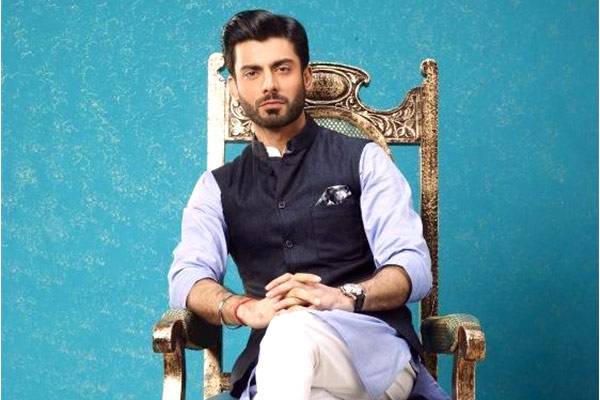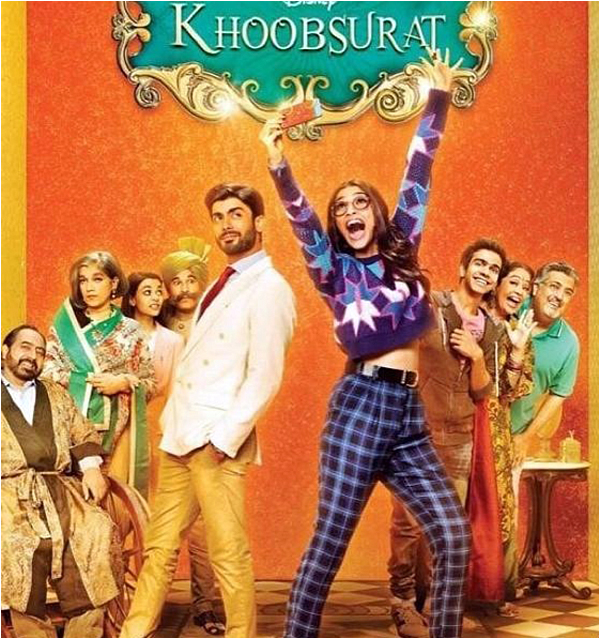
A larger than life Sonam Kapoor appeared on the screen to gush over her love for Disney while I was still trying to make myself comfortable in my seat. ‘Disney princesses were my faaavourite thing as a child. I can’t believe I got the chance to become one in my 20s!’. Before I could manage a full eyeroll, the ladies behind me cut to the core with consumate Lahori ease:
“Twenties? Is she in her twenties?”
“Twenty nine kee ho gee!”
This set the tone for the general level of intellectual engagement for the rest of the evening.
I don’t remember any other princess breaking character before the start of the movie to declare her passion for the Disney conglomerate. In the age of Frozen and Malificent, it strikes a particularly jarring note. Disney Princess? Didn’t that ship sail a couple of decades ago? Besides, whoever heard of a live-action Disney princess? Enchanted? Wasn’t that from a pre-Pixar Disney era even Disney wants to excoriate from its history? The whole idea seems like it was dreamed up by some jaded old suit in a boardroom who figured dumb brown audiences would lap up a stale 90s formula as long as it was wrapped in a twinkling golden D.

[quote]This confusion ultimately churns out a film as plastic as Sonam's smile[/quote]
As it stands, Khoobsurat is a mess of Sonamesque proportions, suffering badly from its schizophrenic desire to have one leg in the Hrishikesh Mukherjee boat and the other on a Disney steamliner. This confusion ultimately churns out a film as plastic as Sonam’s smile. Drawing false comparisons to a classic whose subtle allegory of the Indira Gandhi emergency this film cannot even begin to fathom, let alone emulate, does Khoobsurat no favours; any resemblance to the 1980 Rekha starrer is just a ploy to cash in on 70s-inspired nostalgia that has so far been unable to produce a single remake worth watching, whether Don or Chashm-e-Baddoor.
Milli (Sonam) is presented to us as a tomboyish, carefree woman-child whose chief charm resides in her ability to win people over with her simple, artless ways. This suspension of disbelief is considerably hampered when Kapoor fills every frame with perfecly clashing outfits, matching nail polishes and a sleek, high pony tail that would be perfectly at home on a Cannes red carpet. In a film so heavily reliant on the female lead, this inability to forget how pretty she is in her cute-as-button outfits and perfectly swept cheekbones makes Milli completely unbelievable, and undesirable.
Almost as bad is the sad caricature that is Ratna Pathak Shah’s over the top reworking of the steely matriarch’s role, played with such subtlety by her mother Dina Pathak in the 1980 original.
It is somewhat of a miracle then that Fawad Khan manages to pull off an understated and charming performance despite the vagaries of his director, co-stars and script, transporting his romantic-hero persona from the television to the cinema screen with discernible ease. One can’t help but be excited at the prospect of him in films with more adept actors and bigger banners. Though the fact that his Urdu accent has been leveraged to fit him into a polished Prince’s role who addresses himself in the collective pronoun and rocks sherwanis and pyjamas could be a matter of concern for him. He doesn’t need to be typecast at the very beginning of his film career as the refined actor from Pakistan fit only for highbrow or Muslim-style roles.
[quote]All the young and old women swooning over Fawad only know him from his Humsafar incarnation[/quote]
I have to admit it was quite a thrill to see Fawad Khan’s face pop up on the screen as the opening credits rolled, our fascination with Bollywood – the greatest source of desi entertainment all our lives – being such. The overwhelming response to Khoobsurat in Pakistan (while having done fairly lukewarm business in India) is a testimony to the overarching power of Pakistani drama which is currently our pop culture’s mainstay. All the young and old women swooning over Fawad only know him from his Humsafar incarnation, the Fawad of EP a distant memory now banished to the collective consciousness of a very small urban middle class that was young (and hip) in the early 2000s. Pakistani pop music, once a force to be reckoned with is now a decrepit old man in the corner, occasionally emitting a few gasps that only serve to highlight its feeble state, probably the reason Ali Zafar’s films have never generated a similar hysteria in the country. For those of us who loved EP, Fawad Khan’s transformation from the angry young, vocally anti-corporate, headbanging rockstar into the romantic Prince of a Disney film is fascinating. But that’s the way the wind blows. Idealism is the past; the new Fawad Khan, if he plays his cards right, could well become the latest Khan to rule Bollywood. And that is a better prospect than fading away with all the other lights of our once thriving music industry.
“Twenties? Is she in her twenties?”
“Twenty nine kee ho gee!”
This set the tone for the general level of intellectual engagement for the rest of the evening.
I don’t remember any other princess breaking character before the start of the movie to declare her passion for the Disney conglomerate. In the age of Frozen and Malificent, it strikes a particularly jarring note. Disney Princess? Didn’t that ship sail a couple of decades ago? Besides, whoever heard of a live-action Disney princess? Enchanted? Wasn’t that from a pre-Pixar Disney era even Disney wants to excoriate from its history? The whole idea seems like it was dreamed up by some jaded old suit in a boardroom who figured dumb brown audiences would lap up a stale 90s formula as long as it was wrapped in a twinkling golden D.

[quote]This confusion ultimately churns out a film as plastic as Sonam's smile[/quote]
As it stands, Khoobsurat is a mess of Sonamesque proportions, suffering badly from its schizophrenic desire to have one leg in the Hrishikesh Mukherjee boat and the other on a Disney steamliner. This confusion ultimately churns out a film as plastic as Sonam’s smile. Drawing false comparisons to a classic whose subtle allegory of the Indira Gandhi emergency this film cannot even begin to fathom, let alone emulate, does Khoobsurat no favours; any resemblance to the 1980 Rekha starrer is just a ploy to cash in on 70s-inspired nostalgia that has so far been unable to produce a single remake worth watching, whether Don or Chashm-e-Baddoor.
Milli (Sonam) is presented to us as a tomboyish, carefree woman-child whose chief charm resides in her ability to win people over with her simple, artless ways. This suspension of disbelief is considerably hampered when Kapoor fills every frame with perfecly clashing outfits, matching nail polishes and a sleek, high pony tail that would be perfectly at home on a Cannes red carpet. In a film so heavily reliant on the female lead, this inability to forget how pretty she is in her cute-as-button outfits and perfectly swept cheekbones makes Milli completely unbelievable, and undesirable.
Almost as bad is the sad caricature that is Ratna Pathak Shah’s over the top reworking of the steely matriarch’s role, played with such subtlety by her mother Dina Pathak in the 1980 original.
It is somewhat of a miracle then that Fawad Khan manages to pull off an understated and charming performance despite the vagaries of his director, co-stars and script, transporting his romantic-hero persona from the television to the cinema screen with discernible ease. One can’t help but be excited at the prospect of him in films with more adept actors and bigger banners. Though the fact that his Urdu accent has been leveraged to fit him into a polished Prince’s role who addresses himself in the collective pronoun and rocks sherwanis and pyjamas could be a matter of concern for him. He doesn’t need to be typecast at the very beginning of his film career as the refined actor from Pakistan fit only for highbrow or Muslim-style roles.
[quote]All the young and old women swooning over Fawad only know him from his Humsafar incarnation[/quote]
I have to admit it was quite a thrill to see Fawad Khan’s face pop up on the screen as the opening credits rolled, our fascination with Bollywood – the greatest source of desi entertainment all our lives – being such. The overwhelming response to Khoobsurat in Pakistan (while having done fairly lukewarm business in India) is a testimony to the overarching power of Pakistani drama which is currently our pop culture’s mainstay. All the young and old women swooning over Fawad only know him from his Humsafar incarnation, the Fawad of EP a distant memory now banished to the collective consciousness of a very small urban middle class that was young (and hip) in the early 2000s. Pakistani pop music, once a force to be reckoned with is now a decrepit old man in the corner, occasionally emitting a few gasps that only serve to highlight its feeble state, probably the reason Ali Zafar’s films have never generated a similar hysteria in the country. For those of us who loved EP, Fawad Khan’s transformation from the angry young, vocally anti-corporate, headbanging rockstar into the romantic Prince of a Disney film is fascinating. But that’s the way the wind blows. Idealism is the past; the new Fawad Khan, if he plays his cards right, could well become the latest Khan to rule Bollywood. And that is a better prospect than fading away with all the other lights of our once thriving music industry.

